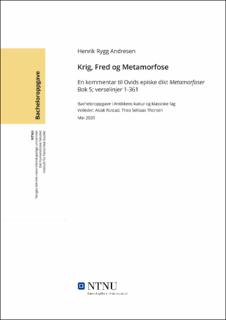| dc.contributor.advisor | Rostad, Aslak | |
| dc.contributor.advisor | Thorsen, Thea Selliaas | |
| dc.contributor.author | Andresen, Henrik Rygg | |
| dc.date.accessioned | 2021-09-13T16:01:47Z | |
| dc.date.available | 2021-09-13T16:01:47Z | |
| dc.date.issued | 2020 | |
| dc.identifier | no.ntnu:inspera:57495148:37676083 | |
| dc.identifier.uri | https://hdl.handle.net/11250/2775501 | |
| dc.description.abstract | ‘Den augusteiske gullalder’ – en betegnelse som brukes for de sosiale og kulturelle strømningene i Romerriket under keiser Augustus. Dette var en tid med etterlengtet fred – en av Augustus’ kjerneverdier. Han hadde et sett med idealer og verdier han brukte som kompass for å reetablere rikets idealtilstand. I det kulturelle veiskillet mellom republikkens frie tøyler og det systemorienterte og sensurerte prinsipatet finner vi verkene til noen av verdens mest kjente diktere, som bruker dikterkunsten til å diskutere de samtidige endringene. En av forfatterne ved navn Ovid begynte først diktningen sin etter borgerkiren var over og Augustus hadde makten. Selv om han som regel diktet om fredfulle motiver, så viste verket Metamorfoser at han var en allsidig dikter. I utdraget jeg har valgt (bok V, 1-361) bruker Ovid myten om helten Persevs for å utforske motivene krig og fred. Han refererer til samtidige hendelser og parodierer mytiske scener. Dikteren virker selv å konkludere med at krigen Augustus førte mot Marcus Antonius var en nødvendighet for at riket skulle nyte fred.
Oppgaven består av en utfyllende innledning som ønsker å kartlegge historiske hendelser i Ovids levetid, hans forfatterskap, Augustus’ politikk og moral, verkets karaktertrekk og overlevering, samt en redegjørelse for Persevs myten. Deretter begynner kommentaren. Jeg presenterer hva jeg ser etter i verket, og funnene mine, før jeg samler noen av tankerekkene i en konklusjon. | |
| dc.description.abstract | The Augustan age, a golden age – a phrase used to describe the social and cultural currents in the roman empire under emperor Augustus. This was a time of long-awaited peace, a core value in Augustus’ repertoire of morals and ideals which defined his politics. He used this moral compass to reestablish the grandeur of the roman republic in a new government called the principate. In the crossroads between the free reins of the republic and the increasing censorship of the new government, we find some of the worlds most renowned poets. They are known, among many things, for their ability to use the art of poetry to discuss the current events with its readers. Among these were Ovid, who first debuted as a poet after the civil war had come to an end and Augustus had assumed the role as head of the state. Even though Ovid usually portrayed scenes of peace and discussed questions of love, he showcased tremendous versatility as a poet in works such as the Metamorphoses. In the excerpt I have chosen (book V, 1-361) Ovid uses the Perseus myth to explore the aspects of war and peace. In this effort he references multiple concurrent events and creates parodies of characters from works of other ancient poets. Ovid himself seems to conclude that the war Augustus had fared against his rival Marcus Antonius was a necessity for the new empire to thrive.
This thesis consist of a comprehensive introduction that aims to map out the historical events in Ovid’s lifetime, his authorship, Augustus’ politics and moral, the traits and handover-tradition of the work, as well as an account of the Perseus myth. From this point I begin the commentary. I preface what I will be looking for in my reading and will present my findings as I go. In the very end I attempt to gather some of my thoughts in a conclusion. | |
| dc.language | | |
| dc.publisher | NTNU | |
| dc.title | Krig, Fred og Metamorfose | |
| dc.type | Bachelor thesis | |
